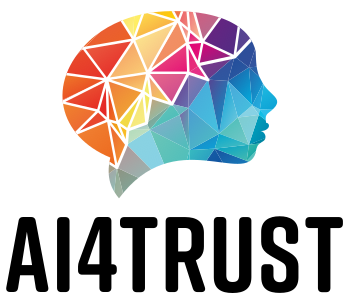
AI4TRUST on SKYTG24: the challenge of AI and the fight against disinformation
Artificial intelligence and online disinformation: these topics were discussed on ‘Progress’ Saturday 1 July 2023, the SKYTG24 Italian TV programme hosted by Helga Cossu. The discussion was attended by Riccardo Gallotti, researcher at the Fondazione Bruno Kessler (FBK, Italy) in Trento, digital culture expert Nicola Bruno and SkyT24 journalist Andrea Dambrosio. An opportunity to also explain the AI4TRUST project, financed by the European Union and coordinated by FBK: ‘A project involving 17 European partners: universities, research institutes, media and networks of fact-checkers, and which was set up with the aim of countering the conscious or unconscious sharing of false content. The aim is to develop a hybrid platform, based on artificial intelligence and managed by people, in this case journalists, fact-checkers, and policy-makers to combat the phenomenon of disinformation and misinformation‘. The arrival of software such as ChatGPT has radically changed the context: there is a risk that these tools can increase the spread of fake news, and AI4TRUST wants to counter this’, said Dambrosio.
Furthermore, Dambrosio added: ‘The central point is to understand that artificial intelligence can itself be a useful tool to combat disinformation’, words echoed by Gallotti: ‘The language of artificial intelligence is made to be specialised, suitable for a particular audience, and it is difficult to recognise whether it is false or not. The AI4TRUST project is very complex, there are already many tools that can recognise false content, we want to do this in a single platform, automatically identifying the news most at risk of disinformation. This platform will be used by journalists, fact-checkers, and policy-makers‘.
‘The amount of disinformation is growing’, said Nicola Bruno, ‘but so are the tools available to check the veracity of the content. It is important to launch information campaigns that reach out to all citizens, journalism is fundamental in a democracy, it is welcome that AI4TRUST gives journalists tools to do their job. Often there is no filter in information, even citizens have to approach content with a more critical spirit. For textual content, ChatGPT has released a tool to understand whether a text is created by AI or not, but these tools still need to be perfected’. Then on the importance of training: ‘We talk in schools about this issue, it is fundamental to develop a critical spirit and an ethics in this sense, we must always report if we put fake content online, even in jest. Then I would like to stress how important it is also to be creative, you have to create textual and visual content with artificial intelligence knowing its potential and limitations. A lot of schools fear AI, instead each of us has to make a more constructive contribution, creating content with these tools, so we can have a contribution to make online information better’.
In conclusion, Gallotti stated: ‘Today, it is easier to identify fake images and audio than text content, and this is a theme we will develop with AI4TRUST. Now, one can identify the intention of the text, i.e. whether it was fraudulent and created to convince people, as in the common case of clickbait, but this is still a long way off. One can identify the vocabulary used, if this was different from that used by human beings, but let us remember that not even those who developed the tool can recognise whether the text is created by an artificial intelligence or not’. Then, on the importance of dialogue with social network platforms: ‘Right now we have the possibility to dialogue with social networks, this, I hope will create a fruitful dialogue between us researchers and those who circulate news, because we need data that they can provide us with to create models that identify fake news’.


